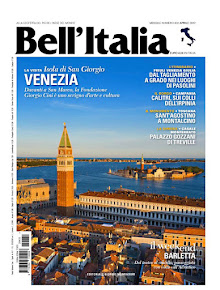 I entered the Centro Storico through an original city gateway at one end of Piazza della Repubblica. The arching-stone galleria leads you in towards what was once the private courtyard of the convent for the Sisters of the Benedictine Order, inhabited solely by nuns until the 1600’s. Once through this gateway my whole sense of the town is transformed. Gone are the expansive panoramas; the dramatic vistas of the Valle d'Ofanto and mountains in the near distance, curtained with morning fog or hidden by clouds at eye level. Inside the stone walls of the town the horizon is all but vanquished. Replaced by rows of stone houses on narrow cobbled lanes with only slices of sky overhead between the rooftops. The houses are not hard to appreciate; each one witness to an age long ago, their doors either weathered and abandoned, or only seemingly so, with some evidence of an elder or two residing there.
I entered the Centro Storico through an original city gateway at one end of Piazza della Repubblica. The arching-stone galleria leads you in towards what was once the private courtyard of the convent for the Sisters of the Benedictine Order, inhabited solely by nuns until the 1600’s. Once through this gateway my whole sense of the town is transformed. Gone are the expansive panoramas; the dramatic vistas of the Valle d'Ofanto and mountains in the near distance, curtained with morning fog or hidden by clouds at eye level. Inside the stone walls of the town the horizon is all but vanquished. Replaced by rows of stone houses on narrow cobbled lanes with only slices of sky overhead between the rooftops. The houses are not hard to appreciate; each one witness to an age long ago, their doors either weathered and abandoned, or only seemingly so, with some evidence of an elder or two residing there.The January sun reflected off the white washed walls of some grand patrician houses as I climbed higher through the labyrinth. On via Giuseppe Tozzoli a double wooden portico lay open to the lane. The cavernous entryway seemed a passage to an epoch long past. Unlike the damp dark courtyards of centuries-old buildings I'd visited in the heart of Naples - echoing with women’s voices from apartments above - inside here was silent. The walls were sun-bleached dry and crumbled. Weeds grew out of the stone and ironwork several stories overhead. No voices lived here now, nor it seemed, had they for many years.



















